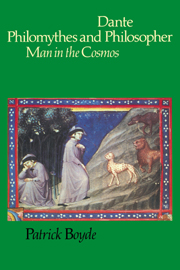9 - Creation (Paradiso XXIX, 1–57)
Published online by Cambridge University Press: 17 September 2009
Summary
The problems presented by Genesis I.I
the book of genesis knows nothing of the five elements arranged in thirteen concentric spheres, nothing of the Scale of Being, and nothing of the relayed influences of the seven planets and the twelve constellations of the Zodiac. It speaks of angels, but it does not tell us how, why or where they were created. Its concept of creation – if it is proper to talk of a ‘concept’ – veers between the simple giving of orders and the activity of a craftsman moulding or shaping some pre-existent material. It never hints at irradiation, emanation, semination, the procession of number or the projection of missiles. More than this, its opening words read like an unequivocal challenge ante litteram to the fathers of Western philosophy. Against Aristotle and the Peripatetics it asserts that the world did have a beginning, and that the Prime Mover was also a Creator; against Plato and the Neoplatonists it insists that the earth too was made by God directly and not by his underlings. Nothing could be more plain and uncompromising than the first verse: ‘In the beginning God created heaven and earth’ (In principio creavit Deus caelum et terram). No one could call himself a Christian and deny that stark affirmation. It was, after all, echoed in the opening words of the Creed: ‘I believe in the one God, the Father almighty, Maker of heaven and earth, and of all things visible and invisible.’
- Type
- Chapter
- Information
- Dante Philomythes and PhilosopherMan in the Cosmos, pp. 235 - 247Publisher: Cambridge University PressPrint publication year: 1981



